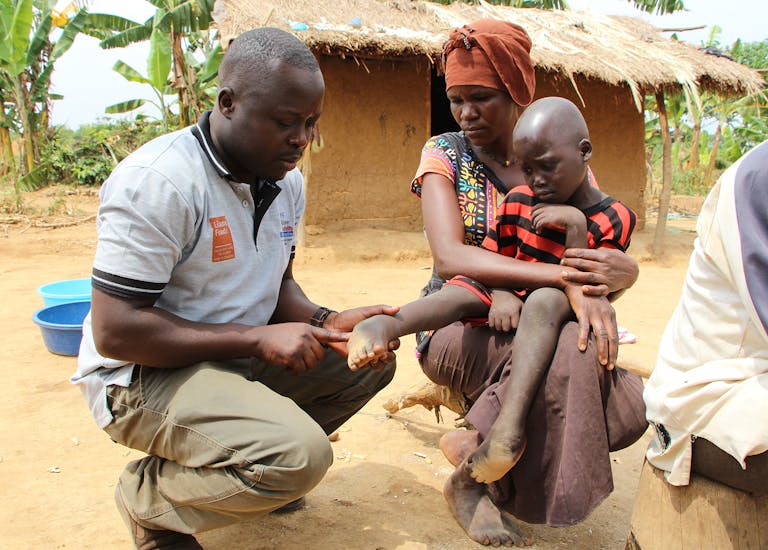STEP

Improved home-based rehabilitation for children with neurological disorders
Field workers in Community Based Rehabilitation (CBR) often have limited educational background and access to specialized courses. As a result, they lack experience and skills to effectively advise on intervention processes and to guide families. With the STEP project we aim to improve the quality of interventions, including assessment, planning and practice. The project is a two-year pilot that started in May 2018 in Cameroon, North Uganda, North-East Kenya and South Tanzania.
Focus on neurological disorders
The large variety and degree of disabilities is a challenge when it comes to improving the competences and impact of field workers. In low and middle-income countries a major concern is delivering effective services for children with neurological disorders, mainly cerebral palsy (CP). The STEP project focuses on CP as a result of birth trauma, trauma before age one, HIV, malaria, meningitis and microcephaly.
While CBR programs worldwide increasingly address the social aspects, the (para)medical and technical aspects frequently remain at a low level. Furthermore, both field workers and caregivers often have low expectations about the chance of improving the child’s situation.
Methods and tools
With the STEP project, Liliane Fonds wants to develop new methods and tools that will improve the quality of care, quality of life and functioning of children with neurological disorders. A precondition is that these methods are evidence based and adapted to the materials and possibilities of the regions concerned.
Within the first year of the pilot, the following steps will be taken to support field workers:
- Training: five-day practical training for field workers on the steps of the intervention process, followed by a six-month coaching period concluded by again a five-day training. After the training, they can use the App (see below) as a source of information and for interaction with rehabilitation experts.
- CP App: smartphone application guiding field workers through all steps of the intervention process, from meeting the family towards goal setting.
- Posters/flash cards: providing basic support to caregivers on the care, rehabilitation and referral (for assistive devices and/or medication) of their children.
- Medication: raising awareness with field workers and caregivers on the importance of medicine adherence for children who experience seizures, as well as clear referral chains to and from medical facilities.
- Empowering caregivers: support to caregivers at home by field workers in such a way that they better understand their child’s condition, are confident in caring for their child, and know their child’s capabilities.
- Parent support groups: bringing together caregivers in parent support groups to share their experiences and to have a voice in the community regarding the development and treatment of their children.
Partners
A large number of national and international experts on research and rehabiliation are involved in the STEP project. They represent among others Dutch rehabiliation centres and the London School of Hygiene and Tropical Medicine.




